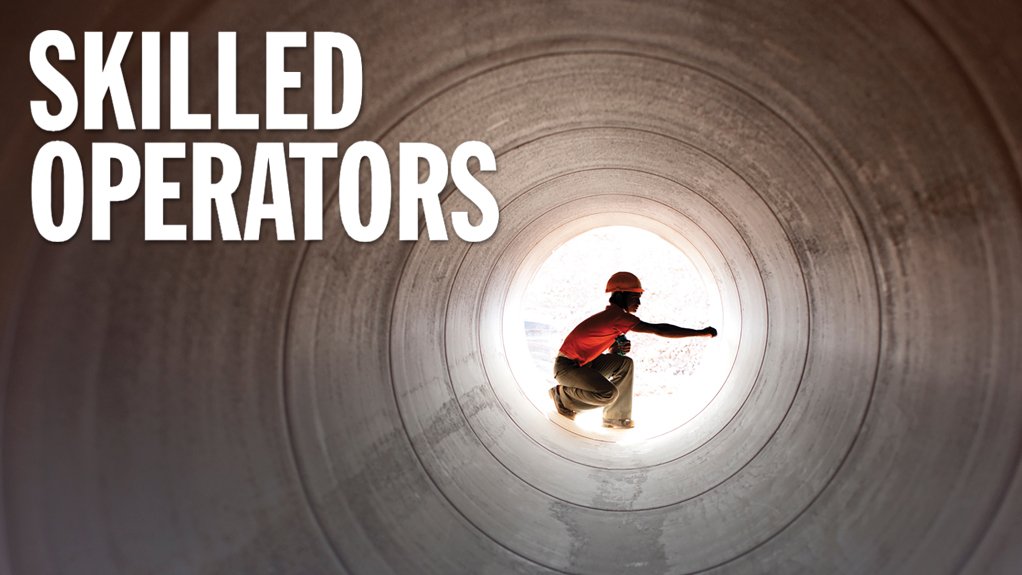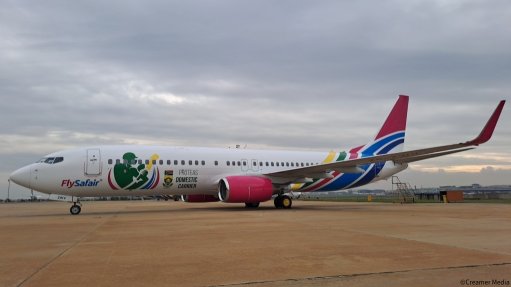People at the heart of South Africa’s water sector recovery
The complexity of the water sector in South Africa, along with the numerous and seemingly insurmountable challenges faced, demands a series of integrated interventions – and people are at the centre of these solutions.
South Africa’s long-known water woes are the result of several factors, exacerbated by the fact that it is a water-scarce country sensitive to climate change impacts.
“Where we find ourselves in the world today, where we find ourselves in South Africa, as far as water is concerned, is a difficult space,” says World Bank senior adviser, South African Presidential Climate Commission climate adaptation lead and Institute for Security Studies senior research associate Dhesigen Naidoo.
He cites, besides other challenges, climate change and climate-related extreme weather events, unreliable water supply, “less than adequate” water conservation and demand management, as well as ageing and poorly maintained infrastructure.
Human capital will be a critical component in solving these complex water challenges, said Energy and Water Sector Education and Training Authority CEO Mpho Mookapele during a Creamer Media webinar, titled ‘Strengthening South Africa’s water infrastructure’.
However, the sector is “getting stuck” in the maintenance, procurement and financing of – and policies around – water infrastructure, and not focusing enough on skills, which often become compliance exercises.
“Often skills development and people become a topic in a conversation after significant plans have been made,” she continues, warning that people are key to infrastructure development, operations and maintenance, as, without people, that infrastructure investment is wasted.
Department of Water and Sanitation (DWS) director-general Dr Sean Phillips points to the findings in the recently released Blue, Green and No Drop reports, which show that the municipalities with the poorest results in terms of drinking water quality also had the highest shortages of the required skills, such as qualified process controllers, while the municipalities with the best-performing drinking water systems in terms of water quality had the lowest shortages of the required skills.
“This shows that skills are as important as, if not more important than, the condition of infrastructure as a determinant of drinking water quality,” he says.
“Sometimes the sector is too caught up in the issue of infrastructure, and does not pay enough attention to the softer issues, which are often much cheaper to address than infrastructure, such as getting the required skills in place and making sure that the required treatment processes are followed.”
The lack of skills in municipalities is often a case of municipalities not hiring people with the required skills, appointing unqualified people to positions or not filling the positions at all, and not necessarily an indication of a national shortage, he said in response to a question posed by Engineering News & Mining Weekly during the webinar.
“We have to make our municipalities work better,” he says, noting that the DWS is already working with the Department of Cooperative Governance and Traditional Affairs, the South African Local Government Association, water boards and the private sector, besides others, to ensure that municipalities deliver on their mandates, including specifics in terms of the qualifications required for the running of the various-sized treatment plants and the filling of posts by a competent person.
It will require legislative and regulatory measures such as those proposed in the draft Water Services Amendment (WSA) Bill, which introduces a requirement for municipal water service providers (WSPs) to have an operating licence and for water service authorities to only appoint or approve licensed WSPs with the minimum skills required, ensuring minimum capability levels.
Amendments to the WSA would tackle widespread municipal dysfunction, and the involvement of the private sector would be key to supporting municipalities, says Phillips.
While privatising water is not on government’s agenda, government does want higher levels of private-sector financing of water and increased involvement of private-sector skills in the management of water services.
A Clear Vision
Mookapele says a clear vision – along with a clear outline of the skills that could bring that vision to fruition – is required to enable the recovery of South Africa’s embattled water sector.
“We might have a picture of what our own companies require. But, if we were to collate an entire picture of South Africa, do we have a good picture of the skills to manage the current challenges? Do we have a good picture of the proper skills that are required in our country to drive this sector out of where it is right now into where we want it to be?”
With no clear vision, the risk is not managed and artisanal and skills programmes will continue without responding to the sector’s evolving needs or deliver the impact of human capital.
Transitional, transformational and integrated thinking is required.
There is a bigger requirement beyond technical capability, including management and executive development, strategic thinking, procurement, project management, infrastructure materials and policymaking and regulatory skills, besides many others, she says.
“I think our posture towards people and skills development in our country needs to shift away from a social exercise [and needs] to be seen as a strategic element of planning for the water sector.”
“There is enough money in the country to train and build capabilities. There are enough brains in the country to plan, to transfer and to teach others.”
Baselines
A lack of water in some schools across South Africa creates an opportunity for young people to become more involved in South Africa’s water sector and grow the required skills, Mookapele comments.
“How do we partner with the private sector to bring initiatives to schools, enabling the school and the students to develop solutions for their own schools and assist them to implement those?”
This can create a pipeline for “water- excited” people that can serve municipalities and water service authorities in South Africa in the future.
Her comments were in response to remarks by PepsiCo South Africa sustainability manager Sean Powers, who says that the company works to bring water to schools through partnerships with the Department of Basic Education and local municipalities.
“We partnered with nine schools to refurbish and upgrade ablution facilities, fix leaks and replace or upgrade infrastructure to more efficient systems.”
The company, as part of a larger organisation, also shares and borrows best practices with regard to safety and quality controls and can seamlessly partner with municipalities to contribute to the improved sustainability of water management systems.
“The company has a strong view on being a positive actor in the water space. We are actively looking to be a part of the solution.”
Meanwhile, the Lebalelo Water User Association, which is also undertaking several early childhood development (ECD) projects, including providing various ECD centres and primary and secondary schools with stationary, such as whiteboards, as well as solar power and fibre connectivity, aims to address operational readiness training.
“Where water infrastructure that will be developed within the municipalities will also benefit is from operational readiness training. This is an oversight function from Lebalelo which will help to ensure that, if there are any issues with maintenance or operation, help is close by should it be required,” says Lebalelo Water User Association CEO Bertus Bierman.
Forming part of the Lebalelo Water User Association’s collaborative model, which includes stakeholders such as mines and industries, is a management unit with highly developed skills, experience systems and tools, he says, noting that the association has signed various resource sharing agreements, and there is significant support for municipalities.
“I think the amendment of the WSA will open the door for more support and assistance to the municipalities where they are struggling with water management and maintenance. And as new WSPs emerge, I think the Lebalelo Water User Association’s collaborative model is ideally situated to participate,” he concludes.
Article Enquiry
Email Article
Save Article
Feedback
To advertise email advertising@creamermedia.co.za or click here
Comments
Press Office
Announcements
What's On
Subscribe to improve your user experience...
Option 1 (equivalent of R125 a month):
Receive a weekly copy of Creamer Media's Engineering News & Mining Weekly magazine
(print copy for those in South Africa and e-magazine for those outside of South Africa)
Receive daily email newsletters
Access to full search results
Access archive of magazine back copies
Access to Projects in Progress
Access to ONE Research Report of your choice in PDF format
Option 2 (equivalent of R375 a month):
All benefits from Option 1
PLUS
Access to Creamer Media's Research Channel Africa for ALL Research Reports, in PDF format, on various industrial and mining sectors
including Electricity; Water; Energy Transition; Hydrogen; Roads, Rail and Ports; Coal; Gold; Platinum; Battery Metals; etc.
Already a subscriber?
Forgotten your password?
Receive weekly copy of Creamer Media's Engineering News & Mining Weekly magazine (print copy for those in South Africa and e-magazine for those outside of South Africa)
➕
Recieve daily email newsletters
➕
Access to full search results
➕
Access archive of magazine back copies
➕
Access to Projects in Progress
➕
Access to ONE Research Report of your choice in PDF format
RESEARCH CHANNEL AFRICA
R4500 (equivalent of R375 a month)
SUBSCRIBEAll benefits from Option 1
➕
Access to Creamer Media's Research Channel Africa for ALL Research Reports on various industrial and mining sectors, in PDF format, including on:
Electricity
➕
Water
➕
Energy Transition
➕
Hydrogen
➕
Roads, Rail and Ports
➕
Coal
➕
Gold
➕
Platinum
➕
Battery Metals
➕
etc.
Receive all benefits from Option 1 or Option 2 delivered to numerous people at your company
➕
Multiple User names and Passwords for simultaneous log-ins
➕
Intranet integration access to all in your organisation





















